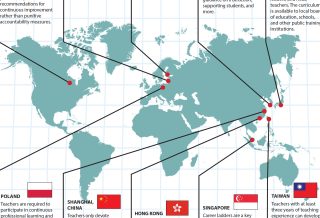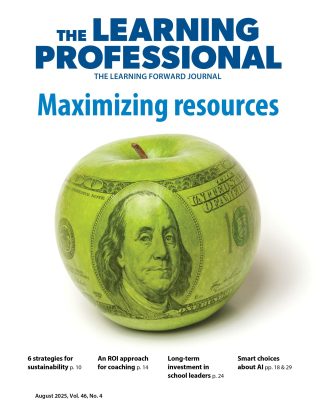IDEAS
3 challenges new coaches face – and how to overcome them
By Lisa L. Ortmann, Katherine Brodeur and Susan Massey
October 2021
Read the remaining content with membership access. Join or log in below to continue.
Sed ut perspiciatis unde omnis iste natus error sit voluptatem accusantium doloremque laudantium, totam rem aperiam, eaque ipsa quae ab illo inventore veritatis et quasi architecto beatae vitae dicta sunt explicabo. Nemo enim ipsam voluptatem quia voluptas sit aspernatur aut odit aut fugit, sed quia consequuntur magni dolores eos qui ratione voluptatem sequi nesciunt. Neque porro quisquam est, qui dolorem ipsum quia dolor sit amet, consectetur, adipisci velit, sed quia non numquam eius modi tempora incidunt ut labore et dolore magnam aliquam quaerat voluptatem.
Reflection questions and discussion prompts
Questions for coaches to reflect on coaching stance
- What was the ratio of coach talk to teacher talk in the conversation?
- Whose ideas are driving the conversation?
- How are you and the teacher developing goals and determining progress toward the goals?
- Is there a balance in responsibility for next steps?
Questions for coaches to reflect on responsiveness
- When and how did the teacher cue for support? How did you respond?
- Did the conversation go off track? If so, was it addressing the teacher’s concerns?
- What happened immediately after the conversation went off track?
Questions for coaches to reflect on feedback
- What did you notice about your nonverbal communication? The teacher’s?
- What specific, observable details from the lesson did you seek to incorporate into the feedback?
- What was the ratio of affirmations to observations?
- How did the teacher respond to coaching questions and suggestions?
References
Bean, R.M., Kern, D., Goatley, V., Ortlieb, E., Shettel, J., Calo, K., Marinak, B., Sturtevant, E., Elish-Piper, L., L’Allier, S., Cox, M.A., Frost, S., Mason, P., Quatroche, D., & Cassidy, J. (2015). Specialized literacy professionals as literacy leaders: Results of a national survey. Literacy Research and Instruction, 54(2), 83-114.
Ippolito, J. (2010). Three ways that literacy coaches balance responsive and directive relationships with teachers. The Elementary School Journal, 111(1), 164-190.
Kucan, L. (2007). Insights from teachers who analyzed transcripts of their own classroom discussions. The Reading Teacher, 61(3), 228-236.
L’Allier, S.K. & Elish-Piper, L. (2012). Literacy coaches in elementary schools. In R.M. Bean & A.S. Dagen (Eds.), Best practices of literacy leaders: Keys to school improvement (pp. 43-62). The Guilford Press.
Lipton, L. & Wellman, B. (2007). How to talk so teachers listen. Educational Leadership, 65(1), 30-34.
Massey, S., Ortmann, L., & Brodeur, K. (2020). Training novice literacy coaches through coaching rounds. In R. Karchmer-Klein & K.E. Pytash (Eds.), Effective practices in online teacher preparation for literacy educators (pp. 150-170). IGI Global.
Ortmann, L., Brodeur, K., & Massey, S. (2020). The learner profiles of novice literacy coaches. Reading Horizons: A Journal of Literacy and Language Arts, 59(2).
Peterson, D.S., Taylor, B.M., Burnham, B., & Schock, R. (2009). Reflective coaching conversations: A missing piece. The Reading Teacher, 62(6), 500-509.
Tripp, T.R. & Rich, P.J. (2012). The influence of video analysis on the process of teacher change. Teaching and Teacher Education, 28, 728-739.
Recent Issues
NAVIGATING NEW ROLES
April 2025
Whether you’re new to your role or supporting others who are new,...
LEARNING DESIGNS
February 2025
How we learn influences what we learn. This issue shares essential...
BUILDING BRIDGES
December 2024
Students benefit when educators bridge the continuum of professional...
CURRICULUM-BASED PROFESSIONAL LEARNING
October 2024
High-quality curriculum requires skilled educators to put it into...














